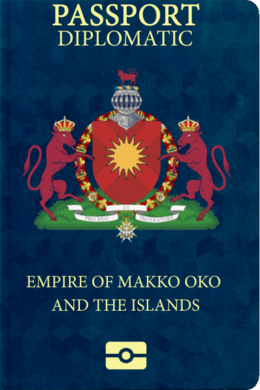Makkonian Passport
| Makkonian passport | |
|---|---|
 Front cover of the 2027 Makkonian Diplomatic Passport | |
| Issued by | Emperor's Passport Office |
| Valid in | All nations |
| Type of document | Passport |
| Purpose | Identification |
| Eligibility requirements | Makkonian nationality |
Makkonian passports are passports issued to citizens of the Empire of Makko Oko and are issued almost exclusively by the Emperor's Passport Office, an agency of the Ministry of Diplomatic Affairs. Per the Nationality & Travel Act, any person that holds a Makkonian passport must use it for both entering and exiting the empire. Notably, unlike other passports of other nations, His Emperor's Government recognizes a passport as proof of citizenship.
While the law does not prohibit holding passports of other governments, it is prohibited to be a citizen of more than one nation while also being a citizen of the empire. The passport entitles citizens to consular assistance abroad at Makkonian embassies and protection therefore. Passports are guaranteed to almost any citizen who pays because of the guaranteed freedom of movement enforced by the Constitution.
History
Passports were issued as early as 1940 as evidence that they had passed the blood ceremony and were thus guaranteed the rights codified under the bill of rights. The passport was a simple piece of paper with an authority's signature emblazoned on it. Forgeries from those less fortunate were rampant during this time up to its abolishment six years later. Passports would later be reinstated upon the start of the Great Santian War in 1950 and was used to discriminate against the citizens and non-citizens, which would later evolve into the modern border controls that all nations have today.
When the Republic of Makko Oko was established on July 30th, 1964, passports became a national government-only function, removing the right to issue them from the cities, which had originally been the issuers after 1950. At the same time, the government started recognizing passports from Liberto-Ancapistan and others, establishing the first border controls and with that, the first restrictions on immigration. Until the abolishment of chattel slavery in 1982, slaves were mandated under the law to hold a "Enslavement Passport" which was a type of passport specifically for slaves that forbade them from leaving the nation without permission from their owner and also restricted their rights domestically. The passport was considered to be proof that they were a slave.
The design and content of the passport has changed over the years. From 1940 to early 1978 passports issued were not machine-readable, and biometric passports would exist starting in 2003, with machine-readable passports being discontinued in 2006. In early 2020, after the end of the civil war, the empire started issuing machine-readable passports with a new look to replace the Republic-era biometric passports. The international community heavily denounced the move, and a new biometric passport was ultimately unveiled in October 2021. The passport would get an updated look in 2027 after Imperial Prince Andrew Woo joined the cabinet as the Minister of Diplomatic Affairs.
